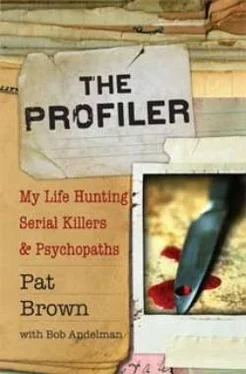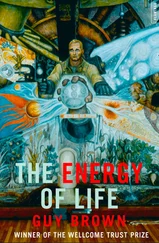There are no support groups for people who think someone killed somebody. No support groups for people chasing serial killers or for those who want to become criminal profilers and change the system. I was a victim of sorts, but there was no support group listed in the newspaper that served someone with my “problem.”
I shared many of the same emotional difficulties that families of victims of unsolved murder suffer from: anger, frustration, rage, fear, and desperation. Thoughts about the crime take over one’s life and, worst of all, the thought that one must continually do something about it. One mother of a murder victim told me she hadn’t swum in her backyard pool since her daughter had been killed because the first time she jumped in, guilt overwhelmed her.
“My daughter will never get to swim again,” she told me. “How could I dare enjoy myself while her killer was still out there?”
I thoroughly understood where she was coming from. Police had done nothing to shake my belief that Walt Williams might have killed Anne Kelley. It was hard for me to do things like go to the movies or read the latest best seller-selfish, frivolous stuff; someone might die because I was wasting time in a theater eating popcorn.
I know this sounds a bit egotistical, like I thought I was the only one who could save the world, but what if I was the only one who really did know who killed Anne Kelley? What if it was Walt and he continued to be a free man? That knowledge dumped a load of responsibility on me and I couldn’t just walk away from it.
So there I was. I felt my time should be dedicated almost exclusively toward solving this mystery, developing evidence, doing something. It was stressful, and there was nobody who understood that.
Then there were the people who started telling me that I was nuts, which didn’t help. And the folks who didn’t say anything, but I could see they didn’t get it because they had that look that says, “We must tolerate those who are a bit out there.”
I would be plagued with doubt. I started questioning myself, thinking, “Gee, maybe I am wrong.” Then I would reread my notes and the evidence would get me back on track.
I became obsessed with working this case night and day, and that was a strain on daily life. I still taught my children, of course, and I still went to all the Boys and Girls Clubs games. I still went to the hospital and did sign language interpreting. The minute I walked into the treatment area I changed my expression completely and everybody would say, “What a Pollyanna! You’re always cheerful and always happy.” They had no idea what I was going through, none.
At a certain point, I was exhausted and realized that I didn’t know how to balance my life. Several people suggested I should get some therapy and counseling, which I eventually concluded was a good idea. It might help me get things in place. I went to a counselor and she immediately thought I was nuts. She suggested medication. I tried to explain the situation as carefully as I could, but the therapist was already pulling out the prescription pad. I didn’t get angry; I just left. I understood exactly what the therapist was thinking upon hearing my crazy-sounding story. I get a lot of those phone calls and e-mails myself, from a lot of people who are nuts, who are psychopaths and attention-seekers.
But once in a while, there is somebody who is telling the truth. I am familiar with the way people communicate and I can usually separate the attention-seekers from those I think are being honest. The ones who are telling the truth I do contact, and I talk with them and work with them. They can’t believe someone professional is willing to give them the time of day instead of telling them to “seek psychiatric help.”
I tried counseling three different times, and then I gave up. That first therapist wanted to put me on antipsychotic drugs of some sort. The second one wanted to hear the cool story and then put me on medication. And the third one told me that she was going to have to take calls during my appointment. “During my appointment?” I objected in disbelief, since I was paying for the damn thing.
The psychotherapist looked at me blankly, apparently failing to see the problem. “Well, some of these people could be suicidal.”
“And some of these people sitting in your office could be homicidal,” I muttered to myself, wishing I could have carried a weapon. Then I just shook my head, walked out, and laughed all the way home. At least the absurdity of it all was good medicine.
A few days later, I called a hotline myself, the one my health care provider offers for online advice, mostly to complain that the whole mental health system sucked along with the criminal justice system; I was in a bit of a foul mood. I told the nurse who answered, “I am so frustrated with the system because I see I can’t get anywhere with it!”
She actually listened to an abbreviated version of my story and didn’t tell me I was nuts. She said, “You’re fighting to do the right thing, what any good citizen should do. Don’t even bother with any mental health therapist. They will only give you drugs. I think your biggest problem is that you are overfocused on one case. You keep picking at that same gnarled knot and if you don’t see any progress with it you have no other easier knot to work with or distract your mind. Why don’t you develop more cases?”
People talk about the “Aha!” or lightbulb moment in their lives when a truth becomes self-apparent, that point when they go, “Of course! That’s what I should do!” And I probably owe the rest of my career in part to the advice of that hotline nurse. Wherever you are, I thank you.
DURING THE YEARS I waited for the police to act, I became a regular reader of my local newspaper, The Washington Post, and I learned that Anne Kelley’s death was not unusual at all.
My original view that this was an anomaly or some freaky circumstance proved to be the height of naïveté. There were dead women turning up all over the Washington, D.C., and Maryland metro area.
In Washington, D.C., alone there were 123 unsolved murders of black females between 1986 and 1996; add in women of other races and female victims killed over the borders of the city in the neighboring states and God knows how many women have been murdered in the area over recent years. If we add in sexual homicides of men and children, the number grows even larger.
Who killed Nia Owens, Dana Chisholm, and Ann Bourghesani? Who murdered Chandra Levy, Joyce Chang, and Christine Mirzayan? Could criminal profiling link any of these cases? Were these murders the work of a serial killer?
How many killers were really out there, living in our neighborhoods, blending in among us, and committing heinous crimes with little fear of being apprehended?
Why had all of these cases remained unsolved?
Dead women were turning up everywhere. It’s like when you’re pregnant and suddenly you notice how many other women are pregnant.
What freaked me out was that not only were there so many dead women, there were no arrests made on a good many of these cases, particularly on the homicides that were clearly serial murders. A woman doesn’t usually end up strangled and naked in the bushes because she had a bad boyfriend. And even if one woman had a boyfriend who raped and murdered her, it’s hard to believe each one of these dead women had a separate rapist for a boyfriend. I didn’t think so. All indicators pointed to serial killers.
I realized that the Anne Kelley case wasn’t an island unto itself. But it was the only knot I was picking on, trying to loosen up a lead, make a bit of progress, and it was driving me nuts. Why don’t you get some more knots? I asked myself.
That advice was brilliant. Without knowing it, it was precisely what I needed to hear. Many victims of crime find that if they can put their knowledge to use and help someone, maybe the unfortunate event that fate brought them wasn’t all for naught. That’s when I first got the inkling that while I may never solve the Kelley case, there are plenty of unsolved murders out there. Who committed those?
Читать дальше












